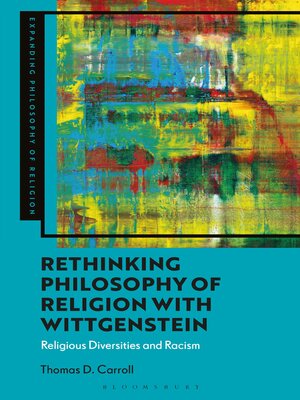Rethinking Philosophy of Religion with Wittgenstein
ebook ∣ Religious Diversities and Racism · Expanding Philosophy of Religion
By Thomas D. Carroll

Sign up to save your library
With an OverDrive account, you can save your favorite libraries for at-a-glance information about availability. Find out more about OverDrive accounts.
Find this title in Libby, the library reading app by OverDrive.



Search for a digital library with this title
Title found at these libraries:
| Library Name | Distance |
|---|---|
| Loading... |
Can Wittgenstein's philosophy help us to see religious diversities? Thomas D. Carroll uses Wittgenstein's thoughts on religion and language to bring a cross-cultural perspective to philosophy of religion.
Through a focus on Chinese philosophical and religious traditions and the intertwining of racism and religion in the United States, Carroll highlights two related features of Wittgenstein's philosophy: the relevance of contextual backgrounds to interpreting ways of life and the importance of reflecting on existential purposes in philosophical inquiry.
Committed to the essential task of expanding philosophy of religion, Carroll critically studies the term "religion" and goes beyond the traditional categories of belief to consider diverse religious phenomena such as rituals, practices, institutions, forms of belonging, and pragmatic forms of religious engagement. We see the value of paying close attention to social contexts and refusing to oversimplify interpretation of philosophical arguments.
By demonstrating how Wittgenstein's ideas can enrich our understanding of the complex phenomenon of religion and the place it has in our lives, this inclusive and timely study asks us to rethink how we approach philosophy of religion.
Through a focus on Chinese philosophical and religious traditions and the intertwining of racism and religion in the United States, Carroll highlights two related features of Wittgenstein's philosophy: the relevance of contextual backgrounds to interpreting ways of life and the importance of reflecting on existential purposes in philosophical inquiry.
Committed to the essential task of expanding philosophy of religion, Carroll critically studies the term "religion" and goes beyond the traditional categories of belief to consider diverse religious phenomena such as rituals, practices, institutions, forms of belonging, and pragmatic forms of religious engagement. We see the value of paying close attention to social contexts and refusing to oversimplify interpretation of philosophical arguments.
By demonstrating how Wittgenstein's ideas can enrich our understanding of the complex phenomenon of religion and the place it has in our lives, this inclusive and timely study asks us to rethink how we approach philosophy of religion.







